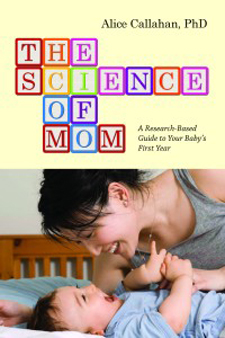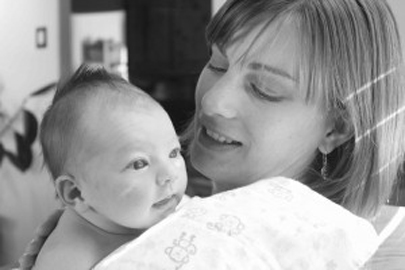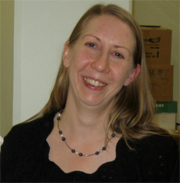Book Review: The Science of Mom: A Research-Based Guide to Your Baby's First Year
By: Anne Estes, PhD | 0 Comments
By Anne M. Estes, PhD
Today on Science & Sensibility, Anne M. Estes, PhD reviews a new book - The Science of Mom: A Research-Based Guide to Your Baby's First Year. Lamaze International and Science & Sensibility are all about providing families and professionals with evidence based information that can help inform decision making. Seems like this book might fit in nicely with the philosophy that Lamaze has held for decades. Regular contributor Anne M. Estes, PhD shares her review on this new book and lets us know if it might be something to add to our resource list for new parents. See the end of the review to learn how you can enter to be chosen for a free copy of this book courtesy of the author, Alice Callahan. - Sharon Muza, Community Manager, Science & Sensibility.
 Mitchell Kapor once said, "Getting information off the Internet is like drinking from a fire hydrant." New parents and child care professionals are certainly easily drenched by all the information that can be acquired on the internet from a variety of sources. As newly minted scientist-mom seven years ago, I was frustrated at the number of opinion and experienced-based baby books that lacked scientific support. The Science of Mom: A Research-Based Guide to Your Baby's First Year, now fills that gap. Alice Callahan, a PhD in nutritional biology and mom of two, systematically examines common questions and concerns about infant care from a scientific perspective. In each chapter, she discusses the historical practice of the question, recommendations of different organizations, the current research, and the risks and benefits of a practice. Dr. Callahan does an excellent job presenting the strengths and limitations of particular studies and the logic behind different recommendations. AlthoughThe Science of Mom is science-focused, it is well-written and easy to read. The style of the book is personal and conversational. Personal experiences are intermingled with the science to illustrate her points well. A list of both the references used for each chapter and recommended books and websites are also given to help parents identify credible resources instead of getting lost in the fog of Internet "experts".
Mitchell Kapor once said, "Getting information off the Internet is like drinking from a fire hydrant." New parents and child care professionals are certainly easily drenched by all the information that can be acquired on the internet from a variety of sources. As newly minted scientist-mom seven years ago, I was frustrated at the number of opinion and experienced-based baby books that lacked scientific support. The Science of Mom: A Research-Based Guide to Your Baby's First Year, now fills that gap. Alice Callahan, a PhD in nutritional biology and mom of two, systematically examines common questions and concerns about infant care from a scientific perspective. In each chapter, she discusses the historical practice of the question, recommendations of different organizations, the current research, and the risks and benefits of a practice. Dr. Callahan does an excellent job presenting the strengths and limitations of particular studies and the logic behind different recommendations. AlthoughThe Science of Mom is science-focused, it is well-written and easy to read. The style of the book is personal and conversational. Personal experiences are intermingled with the science to illustrate her points well. A list of both the references used for each chapter and recommended books and websites are also given to help parents identify credible resources instead of getting lost in the fog of Internet "experts".
Potential readers
For childbirth professionals and parents or parents-to-be interested in evidence-based practices for birth and an infant's first year, The Science of Mom is a new and invaluable resource. Questions covered include: When is the right time to cut the umbilical cord? Which newborn treatments are necessary? How do newborns experience and explore their world? What are the differences between breastmilk and formula feeding? Where and how can babies sleep safely? What is the evidence for vaccinations? When and what kinds of solid food are best for babies?
Importance of evidence based decisions
Perhaps it's also my bias as a scientist, but I greatly enjoyed reading such an insightful description of the process of science, the importance of scientific consensus, differences in quality across studies, and how scientific data can assist families in making informed decisions. Though readers of an evidence based blog like Science and Sensibility may already understand these points, the introduction could be helpful when introducing the rationale behind evidence based practices during child birth classes. It also serves as a guide for anyone who wants to research their own questions in the scientific literature.
I was particularly surprised to read about two instances where changes to medical practices in the early to mid 1900s had occurred without any evidence based support. One example was timing of cutting the umbilical cord. The author speculates that perhaps due to efficiency or convenience, the umbilical cord began to be cut before all the blood was pumped into the newborn. This practice is now being reconsidered due to the increased iron stores in the first 6 months of life of infants when cord clamping is delayed. Such an example certainly reinforces the importance of having evidence of benefit before new procedures are introduced or changes are made in traditional birth procedures.
Filling a gap in the bookshelf
In science and medicine there are no borders and no "right" answers. The Science of Mom is the same. Throughout the book, the author explores how a variety of countries and cultures deal with issues from giving Vitamin K to newborns (oral vs injected) to sleep practices (bed/room sharing vs separate sleeping arrangements). Different personal health conditions and prevalence of disease differ across the globe, making the need for some newborn treatments, such as eye prophylaxis, less clear. Dr. Callahan provides the data and information for people to make informed choices for their own family's practices and situations. I found the honest, open, and nonjudgmental tone throughout the book refreshing.

Author Alice Callahan and her newborn © Alice Callahan
What a scientist-mom adds to the conversation
Each profession trains people to strengthen different skill sets. Training in the life sciences, especially at the PhD level, encourages a person to gather resources, sort through different quality data, synthesize data, and reach a conclusion based on that data for a given situation. Add to that training first-hand experience with raising two kids - knowledge of what it's like to be in the parenting trenches, experience the "mommy wars", and feel the exhaustion and yet love and concern of being a parent - and you've got a winning combination. The author is not a medical professional and most likely has only attended the births of her own two kids. However, in Science of Mom, Alice Callahan, PhD combines the critical eye of a scientist with the heart of a mother to create a helpful resource for all people interested in evidence based infant care and parenting.
What is missing?
What The Science of Mom does not do in general is to give you prescriptives for answering many of the parenting questions she poses. Data are still being collected and debated for many birth and parenting questions. There simply may not be one "right" way. In these cases, the scientific data are presented, the pros and cons of the different perspectives are addressed, then Dr. Callahan recommends following your baby's lead and doing what feels best for your own family. After all, parenting is an art as well as a science.
In situations where scientists have reached a consensus, such as with the benefits of vaccines or back sleeping for infants, the author provides insight into how and why that consensus was reached by the scientific community. In such cases, Dr. Callahan provides additional information such as the role of each ingredient in the vitamin K shot in order to provide additional comfort to worried parents.
The Science of Mom is an excellent new addition to the bookshelves of any birth professional or parent who is interested in evidence-based parenting practices. Although the copy of The Science of Mom that I reviewed was complementary, I have given copies to several scientist-mom friends with newborns who also enjoy the nonjudgmental and objective tone of the book. For those wanting to read more of Dr. Callahan's excellent commentary on the science of parenting, you can find her writing at the blog, The Science of Mom.
Enter to win your own copy of The Science of Mom
Have you had a chance to read this book? What did you think of it? Does this sound like a book that you would like to read? Would you consider adding it to your resource list? Share your thoughts about the book, how necessary or needed a book such as this might be, or other favorite resources for families to get evidence based information in understandable and easy to digest formats in the comments section below and include your email address. All comments will be entered in a drawing for your own copy of the book. The winner will be announced next month when Anne Estes interviews Dr. Callahan about her book. - SM
About Anne Estes

Anne M. Estes, PhD is a postdoctoral fellow at the Institute for Genome Sciences in Baltimore, MD. She is interested in how microbes and their host organisms work together throughout host devel
Published: September 02, 2015
Tags
Lamaze EducatorsBook ReviewBabiesDoulasEvidence Based MedicineInfantschildbirth education businessentrepreneurBusinessbirth businesschildbirth educatorchildbirth professionaldoula businessBusiness DevelopmentAnne EstesAlice Callahan